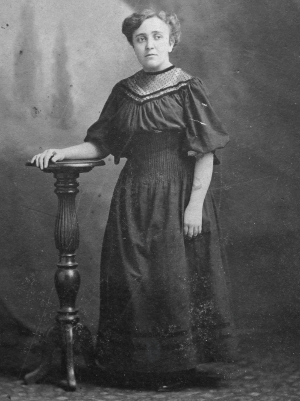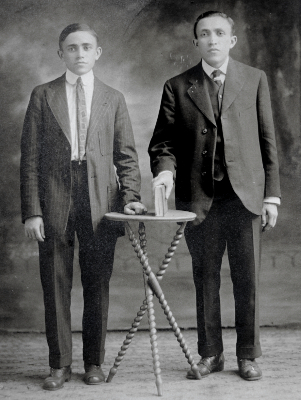Sam Resnick
| During a harsh Ukrainian winter just
after the turn of the 20th century a boy was born to
Leeba (née Yasnov) and Chaim
Ber Prasnik. This fifth
and last child was named Shaya. He was born into a
family of moderate wealth unlike most Jewish
families living in Pereyaslav, not far from Kiev. As
a cattle rancher involved in the meat business,
Chaim Ber could afford to keep his family
comfortable, with maids and tutors for his children.
Shaya would always remember his childhood in Pereyaslav. He remembered the extreme cold of Ukrainian winters, when bearded men walked into the teahouses with icicles hanging from their faces. He remembered deep friendships among the Jewish villagers whose houses were built around common courtyards to foster closeness, guarded by a gatekeeper. Elderly grandparents lived with their children, as his maternal grandmother did until she died at age 95. Boys went to school in cheder where a teacher taught 10-15 boys at a time. Wealthier boys had their own private tutors, but by the time Shaya was ready for school his father—and the family’s wealth—was long gone. Chaim Ber died when Shaya was an infant. The family’s financial status plummeted. Eventually, Leeba found work as a cleaning woman in a hospital in Kiev, about 48 miles northwest of Pereyaslav. She left the care of her young children to her eldest child, Devorah. Devorah had been married to an abusive man, eventually divorcing him and returning to her parents’ home. She was instrumental in raising her youngest brother, Shaya, who viewed her as a second mother. Devorah never left Pereyaslav, and after Shaya sailed to America he never learned what became of her. The second oldest child of Chaim Ber and Leeba’s, born in approximately 1880, was Chaike, a diminutive of the name Chaya. In January 1903, when Shaya was merely two years old, Chaike left Pereyaslav and sailed to America from Antwerp, Belgium. She told the shipping company she was 18 years old, but it is likely she was closer to 23. Later in life she deducted even more years off of her age. Chaike boarded the SS Vaderland in Antwerp on June 13, 1903 after being examined briefly by the ship’s doctor. Another resident of Pereyaslav, 19 year-old Abram Robinowitz, also traveled on this boat. It was a common practice for young single girls to be “escorted” on their voyage by other young adults from their village. Chaike told the shipping company she was going to her cousin Isaac, but no one has ever heard of such person. She was unable to read or write. After arriving at Ellis Island, Chaike was held for a full week because she had no money and was deemed likely to become a public charge. It is unclear why she was eventually released or to whom. What is known is that in America Chaike became Ida.  Leeba
knew Chaike (pictured at left) was of marriageable
age, but was unable to afford any type of dowry for
her after the death of Chaim Ber. As was common
under those circumstances girls were sent to America
to create new lives for themselves and to find
suitable husbands on their own. The next daughter
Chava was sent to America six months after her older
sister. Shaya grew up in Pereyaslav with no memory
of either of these older sisters. Leeba
knew Chaike (pictured at left) was of marriageable
age, but was unable to afford any type of dowry for
her after the death of Chaim Ber. As was common
under those circumstances girls were sent to America
to create new lives for themselves and to find
suitable husbands on their own. The next daughter
Chava was sent to America six months after her older
sister. Shaya grew up in Pereyaslav with no memory
of either of these older sisters.In America Ida made her way to Newark, New Jersey, where she eventually married Max Ontell who was successful in the coal business. When Max Ontell arrived in the United States, using his original given name Schneyer, he was listed as a smith. His previous residence was listed as Rzhyshchiv on the ship manifest even though the entire Ontell family was known to have come from Pereyaslav. Rzhyshchiv is a small shtetl across the Dnieper River from Pereyaslav. Perhaps Max had been serving as an apprenticeship there. Upon his arrival in America, he went directly to his older brother, Josef, in Newark. Ida and Max had one child, Herman (also called Hyman), born in April 1917. Ida’s younger sister Chava changed her name to Eva and married Benjamin (formerly Boruch) Klapper in Manhattan in 1906. They had three children, all born in New York: Herman (a second Herman-sometimes-known-as-Hyman, who, like his first-cousin, was named in memory of his grandfather Chaim Ber), Hilde and Tillie. By 1920 both Ida’s and Eva’s families lived in Newark. In 1911 an event occurred in Kiev that Shaya would remember the rest of his life. He would recall the Beilis Affair clearly, as he was approximately the same age as the victim and aware of the growing anti-Semitism that resulted from this terrifying court case. He would recall Ukrainians roaming the streets with knives and hammers the night the verdict was delivered, ready to kill any Jews if the verdict came back guilty. And as soon as the not-guilty proclamation reached the villages these same Ukrainians acted as if they believed Beilis’s claims of innocence all along. When he was 11 or 12 years old Shaya was sent to Kremenchug, a large city about 126 miles south of Pereyaslav, to apprentice at a wholesale grocer’s. It was common practice to apprentice a child in those days so the boy (and sometimes girl) would learn a trade and alleviate some of the financial burden of feeding that child. Shaya's older brother Lejb Prasnik had been born in late-1890. As was common in that era, Lejb was conscripted into the Tsar’s army at approximately age 20. After serving in the Tsar’s army for three years, Lejb, with Shaya, decided to follow their sisters to America before Shaya was conscripted into the army as well. They sailed from Rotterdam, Holland on the SS Rotterdam, arriving at Ellis Island on August 3, 1914 where Lejb became Louis and Shaya became Sam. (At some point both boys Americanized their family name from Prasnik to Resnick as well.) Louis was able to read and write and was a furrier by trade. Sam was unable to read or write and was also listed as a furrier, although it is doubtful he had any experience in the trade. They moved in with their sister Eva and her husband Benjamin Klapper and tried to make something of themselves.
Louis succeeded as a cap maker, making use of his experience in Pereyaslav as a furrier. He became an American citizen in 1926, while living on Prince Street in Newark. By the time he died in 1940, he was living alone in Wilkes-Barre, Pennsylvania, where he had been working in a cap factory. He never married and was considered a loner by his family. Sam held many different jobs in America such as working for a milkman, in a record factory, in a factory that made skates and chains for cars, in a trunk factory, in a shipyard and finally, in the fruit and vegetable business. He never did learn to read and write, possibly because he was dyslexic, but he was a whiz at math. It was in the fruit and vegetable business that Sam Resnick spent the rest of his working life. Sylvia Dombrow was working in a Newark haberdashery where her sister’s husband worked as a tailor. A co-worker was friends with a young immigrant in town named Sam Resnick. One day Sam stopped by the store to visit his friend and noticed Sylvia. He asked her out on a date but she refused because she was "in love" with a boy she had met on her trip from Poland to America. That evening she told the story to her mother, and her mother instructed her to go out with Sam once, just to be polite. Being an obedient daughter used to doing what her mother asked, whether it was caring for her dying older sister or minding her baby brother, Sylvia agreed to go on a date with Sam. She disliked him immediately, thinking he was a "tough guy" and easily excited. She preferred the quiet, studious type. But Sam pursued her and even flashed a wad of money in front of her mother to impress her. Sylvia’s mother liked him and the attention he paid to her daughter, so she encouraged Sylvia to continue seeing him. Again, Sylvia obeyed her mother, but she was so distraught over the loss of her true "love" she considered running away and eloping with the young man in the Bronx. Eventually, however, on Sunday evening March 1, 1925, Sylvia married Sam in a Jewish ceremony officiated by Rabbi Ralph Eisenberger. Sylvia and Sam welcomed Leatrice 11 months after their marriage. She was the pride and joy of her parents, a beautiful girl who somehow made up for all the hardships her parents had endured. Life seemed like it would finally take a turn for the better. But it was not to be. A few years later Sylvia found herself pregnant again, and late in the pregnancy, while crossing a major thoroughfare in downtown Newark, she was hit by a trolley. She lost the baby boy she was carrying, a loss that would haunt Sylvia and Sam for the rest of their lives
|
Back to Stories
Back to Home
 This site is hosted
at no cost to the public by JewishGen, Inc., a non-profit
corporation. If it has been useful to you, or if you are moved
by the effort to preserve the memory of our lost communities,
your JewishGen-erosity would be greatly appreciated.
This site is hosted
at no cost to the public by JewishGen, Inc., a non-profit
corporation. If it has been useful to you, or if you are moved
by the effort to preserve the memory of our lost communities,
your JewishGen-erosity would be greatly appreciated.© 2014 Bob Levy
